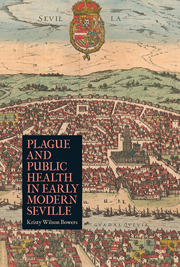Book contents
- Frontmatter
- Dedication
- Contents
- Acknowledgments
- Introduction
- 1 Early Modern Seville: Balancing Growth and Governance
- 2 Perceptions of Plague: Balancing Disease Concepts
- 3 Negotiating Public Health: Balancing the Individual and the Community
- 4 The Wider Politics of Public Health: Balancing Urban and Rural
- 5 City and Crown: Balancing Authorities
- Conclusion
- Notes
- Bibliography
- Index
Introduction
Published online by Cambridge University Press: 05 October 2013
- Frontmatter
- Dedication
- Contents
- Acknowledgments
- Introduction
- 1 Early Modern Seville: Balancing Growth and Governance
- 2 Perceptions of Plague: Balancing Disease Concepts
- 3 Negotiating Public Health: Balancing the Individual and the Community
- 4 The Wider Politics of Public Health: Balancing Urban and Rural
- 5 City and Crown: Balancing Authorities
- Conclusion
- Notes
- Bibliography
- Index
Summary
The first half of the twentieth century brought the hope and expectation that modern science could eradicate disease, that humanity could dominate and control its greatest unseen enemy, microbes. In the 1940s new penicillin treatments helped reduce deaths from infections, while further advances in vaccines helped reduce or eradicate common childhood diseases such as measles, whooping cough, and smallpox. But the lessons of the second half of the century showed just how difficult true mastery of the microscopic world would be, as microbes continued to mutate, shift, and jump from one host to another. Emerging diseases, many of them transferred from animal hosts, such as Hantavirus, Ebola, and Avian Influenza, have continued to challenge medical researchers to find new ways of identifying and preventing such transfers. Other emerging diseases such as Sudden Acute Respiratory Syndrome (SARS) and drug-resistant strains of tuberculosis (MDR-TB and XDR-TB) and staphylococcus (MRSA), combined with modern airline travel, have posed new problems to state authorities attempting to limit the spread of contagious diseases. These efforts have included restricting travel to or from certain areas, quarantining individuals (sometimes against their will), and the wholesale removal and slaughter of livestock, including chickens and pigs, in an attempt to prevent further spread of diseases despite the cost to individuals and communities. All such efforts have prompted renewed debates about the power of the state to coerce individuals and the right of individuals to resist confinement. These debates are not new, however, and societies have long wrestled with questions of how best to prevent or reduce the spread of epidemics.
- Type
- Chapter
- Information
- Plague and Public Health in Early Modern Seville , pp. 1 - 14Publisher: Boydell & BrewerPrint publication year: 2013

